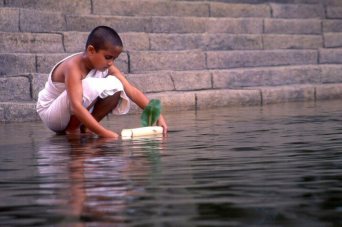Water (Day 9)
 My Opinion: 6.3 || A sensitive, lusciously photographed film that depicts heartbreaking scenes with very little emotional manipulation. Deepa Mehta, who clearly has a great eye for color and composition, manages to indict the heartlessness of Hindu fundamentalism without preaching or stacking the moral deck. Unfortunately, the central romance has a too-good-to-be-true quality that detracts from the film’s otherwise impressive verisimilitude.
My Opinion: 6.3 || A sensitive, lusciously photographed film that depicts heartbreaking scenes with very little emotional manipulation. Deepa Mehta, who clearly has a great eye for color and composition, manages to indict the heartlessness of Hindu fundamentalism without preaching or stacking the moral deck. Unfortunately, the central romance has a too-good-to-be-true quality that detracts from the film’s otherwise impressive verisimilitude.
TITLE: Water
DIRECTOR: Deepa Mehta
LANGUAGE: Hindi | COUNTRY: India
YEAR: 2005
PROFILE: Drama | 116 minutes | IMDb (7.6)
SYNOPSIS (Courtesy of IMDb): The film examines the plight of a group of widows forced into poverty at a temple in the holy city of Varanasi. It focuses on a relationship between one of the widows, who wants to escape the social restrictions imposed on widows, and a man who is from the highest caste and a follower of Mahatma Gandhi.
Strengths: The idea of a child widow (Chuyia) is inherently moving, and Mehta handles it with just the right touch. We feel the widows’ harrowing circumstances and daily humiliation, but Mehta is never heavy-handed in making her moral and emotional points.

Weaknesses: As the film progresses, the narrative is driven by an unlikely romance between a Brahmin lawyer named Narayan and the beautiful widow Kalyani. This could have worked, but Mehta does little to show us how they fall in love. They meet, he’s eternally in love, and that’s that. He’s in love with her, in other words, because the movie needs him to be in love with her. More than that, the man is just too good to be true: rich, introspective, dependable, morally pure, and so handsome.
It all would have been more compelling if there’d been something to complicate Narayan’s personality and motives. For instance, if he initially courted Kalyani only as a political statement but then comes to feel genuine affection for her. (And, also, there’s the nagging voice that says, “How nice for Kalyani that she’s so pretty? What about the windows who are less attractive? Who’s going to save them?”)
Technical: It’s a gorgeous film to look at. Periodically, flaws show up in the film stock — things you’d normally associate with a much older
movie, but it’s presumably do to Mehta’s difficulties in getting the film completed. (It was protested by Hindu fundamentalist groups, and she eventually needed to complete the filming in Sri Lanka.) The camera moves effectively, capturing details and textures that contribute to the great sense of place.

Acting: The child star (Sarala Kariyawasam) does a marvelous job, carrying crucial parts of the film. The women playing the widows are powerfully believable and an affecting presence even when not speaking. The romantic lead, Lisa Ray, occasionally seems too movie-beautiful for these circumstances, but she carries off her role well.
Best Scene: The concluding scene brought a lump to my throat, but it’s too tidy and convenient. There’s a delightful, joyously scored scene in which the widows paint themselves, but unfortunately it’s not well integrated into the rest of the narrative and doesn’t seem to fit. So I’ll single out the tender moments that Chuyia spends with the wizened widow Auntie, followed by Aunti’s death and funeral — delicate writing and poignant acting.
File Under: religious fundamentalism, romance, children, prostitution, devotion